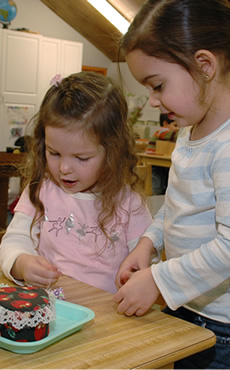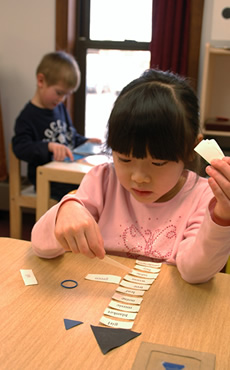The Montessori Philosophy

The Montessori method of education was developed by Dr. Maria Montessori who was the first female, Italian physician. Dr. Montessori developed this approach through the scientific observation of children all over the world. Through her observations, Dr. Montessori found consistent, naturally developing tendencies and characteristics that would serve as the foundation for the creation of optimally prepared environments that would encourage and support the realization of childrens’ full potential.
Every teaching method, however, sparks moments of learning. Then why is Montessori so different? The difference is the method itself. The mind of a child is like a sponge—absorbing everything, always at the ready to learn something new. The primary goal of Montessori education? To turn that spark into a lifelong flame.
Imagine a school…
where education is viewed not just as a means to an end, but as an aid to life; where the method for learning comes not from a curriculum, but from the natural development of your child; a place where creativity, innovation, and individuality are valued as much as concentration, motivation, and persistence; where your child is not just a student, but also a teacher.
Why it Works
These key principles contribute to the success of Montessori education:
- Multimodal Learning – Learning happens through movement, touch, sight and sound.
- Mixed Age Classrooms – Placing children in mixed age groups, corresponding to planes of development, allows them to relate to children who are both older and younger. It also allows for a “confidence interval” around learning in that a child is not labeled as either behind or gifted simply because they acquire a concept a little earlier or a little later than same age peers.
- Observation – Observation of the child reveals the proper timing for the presentation of new information and experiences academically, socially and personally.
- Developmental – Awareness of the needs and abilities during specific times of development allows for optimal engagement and learning for the child.
- Classroom Community – The classroom experience should build on the desire of the young child to master his or her environment. The classroom community is child-centered rather than adult-centered.
- Materials – The use of self-correcting materials allows children to manipulate and explore at their own pace and experience satisfaction and develop self-confidence with success.
Click here to see a chart comparing key characteristics of Montessori and traditional education.
The Research

Montessori education, rooted in human development, driven by observation, inspired by science, and based on timeless and universal human tendencies, has become increasingly popular and better understood in the United States because it is supported by research in psychology, biology, neurology, and additional disciplines. With this new attention, and the current issues facing public education, more and more researchers have begun to study the outcomes and impact of a Montessori education.
Currently, research regarding the success of Montessori education has concentrated in six areas:
- History of Montessori education
- The role of teacher beliefs in Montessori classrooms
- Montessori’s impact on at-risk children
- Montessori’s impact on exceptional learners
- Traditional schooling versus the Montessori method
- The relationship of Montessori principles and practices to optimal experience theory
Additional Perspectives
Key researchers and speakers from outside the Montessori community whose work supports Montessori’s original methods participate annually in AMI/USA conferences. This list includes such prominent names as:
- Angeline Lillard, Ph.D., psychology professor, University of Virginia; author of The Science Behind the Genius. Research from Dr. Angeline Lillard is currently available for download.
- Adele Diamond, Professor of Developmental Cognitive Neuroscience, and author of numerous research articles on the development of cognitive functions including “Interventions Shown to Aid Executive Function Development in Children 4 to 12 Years Old,” which was published in Science Magazine.
- Steven Hughes, Ph.D., L.P., pediatric neuropsychologist and president of the American Academy of Pediatric Neuropsychology.
- Daniel Pink, best-selling author of Drive and A Whole New Mind and expert on innovation, competition, and the changing world of work.
- Bruce Perry, M.D., Ph.D., co-author of The Boy Who Was Raised as a Dog and internationally renowned authority on children in crisis.
- Andrew Meltzoff, Ph.D., co-author of The Scientist in the Crib and child development researcher.
- Noah Sobe, Ph.D., assistant professor in cultural and educational policy studies in the School of Education at Loyola University, Chicago and author of Challenging the Gaze.
- Jane Healy, Ph.D., teacher, educational psychologist, and award-winning author of Failure To Connect.
- Thomas Armstrong, Ph.D., an award-winning author and speaker; author of over a dozen books, including The Best Schools: How Human Development Research Should Inform Educational Practice.
Graduates of Distinction
An AMI Montessori education assists children to develop to their full human potential by helping them “learn how to think.” What do thinking children do when they grow up? They become successful, accomplished adults contributing to a better world.
Some of the most famous entrepreneurs and innovators of today have actively credited their success to the education they received in a Montessori classroom.
- Jeff Bezos | Founder of Amazon.com
- Sergey Brin and Larry Page | Co-founders of Google
- Will Wright | Designer of The Sims video games
- Anne Frank | Renowned World War II diarist
- Katherine Graham | Owner-editor of The Washington Post
- Sean “Diddy” Combs | Rapper and CEO of Bad Boy Records
- Julia Child | First world-famous television chef
- Prince William & Prince Harry | Sons of the Prince of Wales
- Helen Hunt | Academy Award-winning actress
- George Clooney | Academy Award-winning actor
- Chelsea Clinton | Daughter of Bill and Hillary Clinton
- Joshua Bell | American violinist
- Lea Salonga | Multi-awarded singer and Broadway actress
